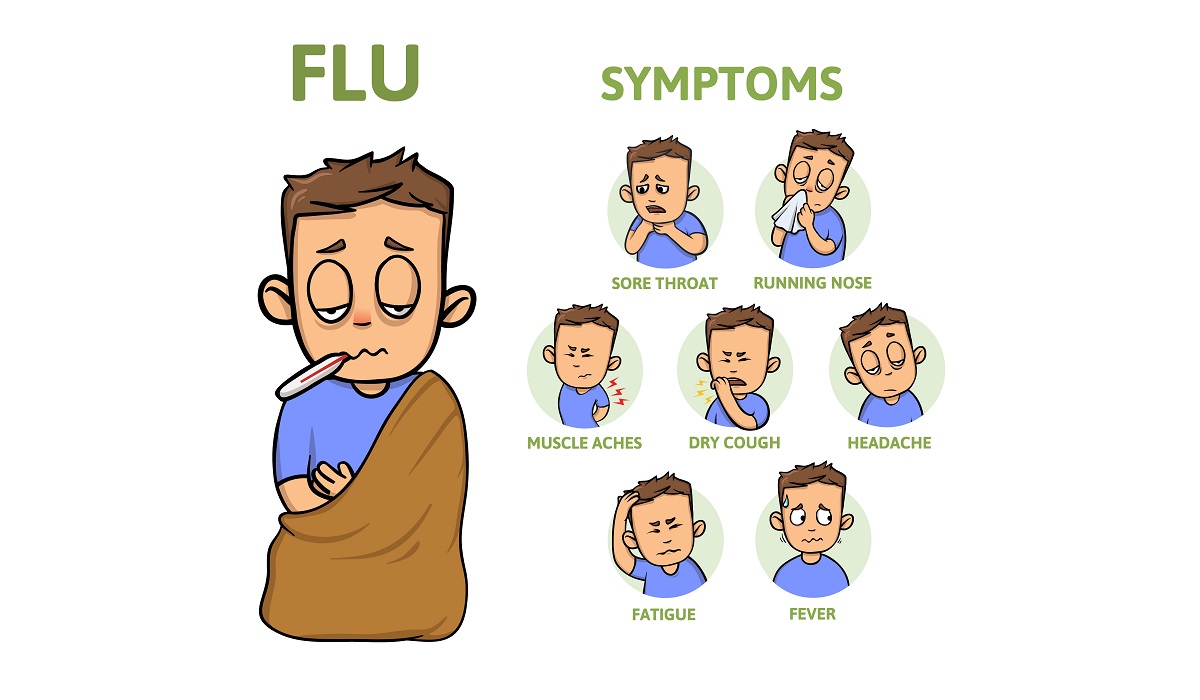Due to the highly contagious nature of the flu, it can spread very quickly. Complications and hospitalisations as a result of the flu are common, especially in some high risk groups such as elderly people, young children, pregnant women and those with a compromised immune system.
While influenza (commonly known as ‘the flu’) can be caught all year round, it’s more prevalent during the colder months in Australia.
When is flu season in the southern hemisphere?
Australia’s flu season is from April to October each year, during the colder months. August is typically the peak month for flu cases.
In the interest of public health and disease control, flu activity is monitored in Australia throughout the year, with more regular reporting during flu season.
Flu symptoms
While some people use the term ‘flu’ and ‘cold’ interchangeably, the influenza virus is different to the common cold.

Seasonal flu symptoms include:
- Muscle pain
- Fever and/or chills
- Sneezing
- Sore throat
- Blocked or runny nose
- Fatigue
- Headache
Influenza can be disruptive to business operations, classrooms and healthcare settings. The flu season can have a huge impact on productivity and patient health outcomes. The flu can be quite serious for people that have a compromised immune system or are otherwise considered to be ‘high risk’.
COVID-19
There’s no denying that the pandemic has changed many facets of our way of life. Certainly COVID-19 has taught us a thing or two about slowing the spread of infectious disease, and many of the things that became second nature during the height of the pandemic (social distancing, wearing a mask, vigilant hand washing/sanitising) can be applied to offer some protection during flu season.
COVID-19 is an influenza-like illness, and therefore shares many of the same symptoms as the flu virus – but you likely have a self-test kit for COVID in your home. If you have flu symptoms but a negative COVID test, it’s possible you have influenza.
Where once upon a time some people would choose to ‘struggle through’ with the flu at work or school, since COVID-19 more people have learned the importance of isolating when they are unwell. This is an effective way of slowing the spread of infectious diseases, and minimising the impact the flu will have on your workplace or classroom this flu season.
Treatment of seasonal influenza
Most people can treat their flu symptoms at home, and will get better on their own. The best thing you can do is stay at home when you are sick to reduce the spread of influenza.
To treat the flu, get plenty of rest and keep on top of fluids. Treat the symptoms such as headache and fever with medication such as paracetamol and ibuprofen when necessary.
The flu is a respiratory virus, and viruses cannot be treated with antibiotics.
How to prepare for flu season
The flu can be extremely disruptive, and certain industries are more at risk of catching the flu, such as those in people-facing roles.
There are some things you can do now to prepare for the upcoming flu season, and ensure the flu season passes with as little illness and disruption as possible.
Flu vaccine
The influenza vaccination is updated each year due to the fact that the flu virus mutates and changes, and the vaccine wears off after 3 to 4 months. It’s important to receive the new flu vaccine every year to offer protection.
Prevent the spread of the flu by ensuring you have the flu shot before the upcoming flu season starts. Flu vaccinations are recommended for everyone over the age of 6 months.
Good hand hygiene
Wash your hands regularly to help reduce the spread of the flu and other infectious diseases.
High quality hand sanitiser should be used regularly, such as aerocleanse antibacterial hand gel.
In healthcare settings or other workplaces where it’s deemed necessary, use nitrile gloves to reduce the germs you come into contact with.
Stay at home if you’re sick
It’s in the best interest of public health if people stay home when they’re sick. Most people can treat their flu symptoms at home.
Cover your mouth
Cover your mouth and nose in the crook of your elbow when sneezing or coughing to reduce the spread of the influenza virus.
If you have to leave the house when you’re sick (for example, for a medical appointment), ensure you wear a mask. People that have compromised immune systems or are in a high risk category can benefit from wearing a mask whenever they are in public during influenza season. A n95 mask is a great option for flu protection.
Keep surfaces clean
Especially in high traffic areas. Regularly clean computer keyboards, door handles, phones and surfaces that often come into contact with people.
First aid kits
Ensure your business or organisation has a well-equipped workplace first aid kit so that you have everything you need to manage the flu season.
Preparation is key
Illness is disruptive to any workplace or classroom. By knowing when flu season is, you can prepare for the upcoming flu season early to minimise the impact seasonal influenza has on operations this year.
Wholesale medical supplies such as hand sanitiser, face masks and disposable gloves can help ensure you are prepared for the upcoming flu season. Having a sufficient stock of medical supplies can help you mitigate the effects of seasonal influenza.
Shop wholesale medical supplies with us here at LFA First Response today to ensure you’re prepared for the flu season this year.










